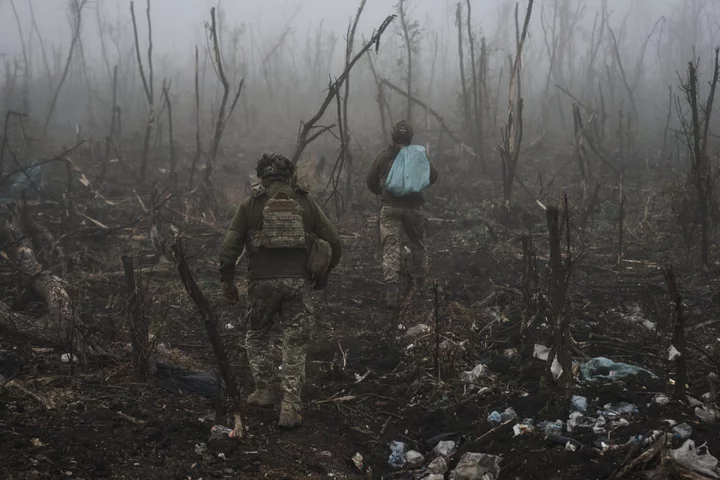
Ukraine-Russia war - live: Putin’s troops forced to regroup as they suffer heavy losses in east, says Kyiv
Vladimir Putin’s troops have been forced to regroup while suffering over 400 casualties a day in a drive to capture the eastern Ukrainian city of Avdiivka, Donetsk, Kyiv claimed. “The enemy is trying to move forward and then we beat them back,” Oleksandr Shtupun, a spokesperson for Ukraine‘s southern groups of forces, said. “So by no means can you speak of a fixed situation of some sort. Heavy fighting is continuing, though activity has subsided somewhat. The enemy is going through some kind of regrouping.” Mr Shtupun said Russian forces had suffered over 400 casualties a day in its campaign which has relied on small assault groups of 30 to 40 men. Meanwhile, North Korea has shipped over 1,000 containers of military equipment to Russia, according to the UK Ministry of Defence. It said Pyongyang was set to become one of Russia’s most significant foreign arms suppliers alongside Iran and Belarus. On Wednesday, Vladimir Putin tested Russia’s ability to launch a massive retaliatory nuclear strike as he pulled the country out of an international test ban treaty. Read More Moscow succession: What would happen if Putin dies? Russia is executing its own retreating soldiers as Ukraine offensive fails, says US A Russia without Putin? Be careful what you wish for... Putin’s many ‘heart attacks’ and why the rumours may be in his favour
2023-10-27 13:48
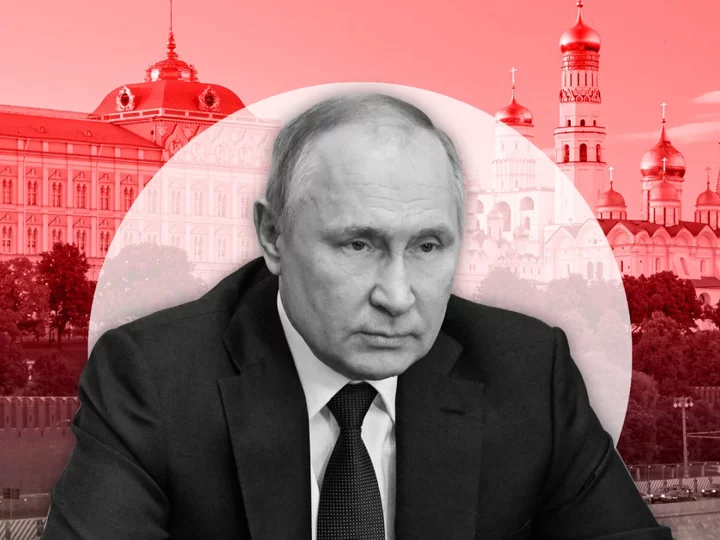
Moscow succession: What would happen if Putin dies?
Thyroid cancer, Parkinson’s disease, leprosy or declining in the aftermath of a stroke - just a few of the many unproven ailments rumoured to have afflicted the Russian leader in recent years. Just this week, the Kremlin were forced to deny rumours that Vladimir Putin had suffered a cardiac arrest in his bedroom, months after they were forced to deny that he had soiled himself. Since gripping the reins of power in 1999, Putin has established himself as one of the most infamous politicians in modern history, with a vicelike grip over Russia. His current term is set to expire next year, yet under sweeping changes to the constitution that were introduced in 2020, he could rule Russia until 2036. Yet since his invasion of Ukraine and the loss of tens of thousands of his troops, the fallout of his military gamble has caused cracks to appear for the first time under his 20-year leadership. Speculation has also dogged the ageing tyrant that his health is failing, with the future of Russia uncertain upon his demise. In June, he faced the greatest threat to his hold on power, after his former ally Yevgeny Prigozhin mounted an armed rebellion and called on his forces to march on Moscow to oust Russia’s military command. Once known as ‘Putin’s chef’, Prigozhin held great influence following the invasion of Ukraine as the owner of the Wagner private military contractor. His growing criticism of the military leadership made him a credible threat to Putin’s regime, with the dictator vowing harsh consequences for his “betrayal” and “treason”. Just two months after his aborted mutiny, Prigozhin died in mysterious circumstances while aboard a plane flying between Moscow and St Petersburg. While this dramatic opposition to the Russian leadership was swiftly quashed, it posed questions about the future of the country’s leadership, and who stands in line to replace their authoritarian leader. His family Unlike other dictators throughout history, Putin’s family are not in the running to replace him, with very few details known about their relationship with the president. Famously secretive about his personal life, his 30-year marriage to flight attendant Lyudmila Shkrebneva ended in divorce in 2013 amid speculation about his extramarital affair with retired gymnast Alina Kabaeva. While it is unknown how many children he has welcomed since the breakdown of his marriage, he had two daughters with Ms Shkrebneva, Maria Vorontsova, 36, and Katerina Tikhonova, 35. Neither have any involvement in politics, while he refuses to name his grandchildren in public, telling a reporter: “The thing is, I don’t want them to grow up like royal princes, I want them to grow up to be normal people.” During one of his rare personal interviews in 2015, he said of his daughters: “My daughters live in Russia and studied only in Russia, I am proud of them,” he said. “They speak three foreign languages fluently. I never discuss my family with anyone.” Mikhail Mishustin If Putin were to die or abruptly step down, the Russian Federation Council has 14 days to call early presidential elections. If it fails to act, the Central Election Commission would call it, while prime minister Mikhail Mishustin would serve as acting president in the interim. He is considered by some however to unlikely option to become a permanent placement, given his lack of popularity with Putin’s inner circle of ‘yes men’. According to the BBC, Mishustin had the “unenviable task of rescuing the economy but has little say over" the Russia-Ukraine war, with sources close to the Kremlin saying he was unaware of Putin’s intentions for a full-scale invasion. Speaking to The Independent, Dr Mark Galeotti said: “Constitutionally, he takes over when the president is dead or incapcitated, he would be incumbent. He’s a classic technocrat choice. I could see that happening, but there are other candidates who would fill the same niche.” Dmitry Medyedev Known as one of Putin’s closest allies, Dmitry Medvedev has been tipped as one of his potential successors. He had previously held the role of president from 2008 to 2012, before stepping aside in what was later revealed to be a prearranged deal. Once considered by the West as a moderate voice within the Kremlin, he has developed a reputation as Putin’s bad cop, referring to Ukrainians as “cockroaches” and making increasingly bellicose nuke-related threats.” The former law professor held the role of Prime Minister from 2012 to 2020, before becoming the deputy chairman of the Security Council of Russia. Over the years however, it is believed that his subservient role under Putin has weakened his own ability to consolidate power amongst Russia’s elite. Sergei Kiriyenko Other names mentioned to take the leadership helm include Sergei Kiriyenko, who has served as First Deputy Chief of Staff since 2016, and is known to be a member of Putin’s closest inner circle. With his involvement over the newly annexed Ukrainian territories, he is understood to have daily access to the president, and maintains good relations with all major key players among Russia’s political elite. Dismissing his chances of ever coming to the forefront of Russian politics however, Dr Galeotti said that he served better as a “backroom” operator. Sergei Shoigu Given the humiliating trajectory of the Ukraine war, Sergei Shoigu is no longer a likely choice to be announced as Putin’s predecessor, despite his position as one of Russia’s most influential men. The defence minister had once been voted the most popular politician after Putin, and is known to be close with the reserved leader, often spending summer vacations together. “Before the invasion, I would have absolutely said Shoigu, but his reputation has now been tarnished with the invasion,” said Dr Galeotti. “He’s still got relatively high levels of public support and trust, and he is a phenomenal behind the scenes operator. The days where he could have been president may be over but as a kingmaker, he could still be really influential.” Nikolai Patrushev The secretary of Russia’s Security Council, Patrushev has known Putin since they worked together in the KGB, and was a major strategist in both the 2014 and 2022 invasions of Ukraine. The 71-year-old is reportedly “one of the few figures Putin listens to”, while his son Dmitry has also been rumoured as a potential successor to Putin given his position as agriculture minister. Other suggestions have included Moscow mayor Sergei Sobyanin, former bodyguard Alexei Dyumin and chief of staff Dmitry Kozak. “It’s going to have to be someone who could create a coalition, who is able to be acceptable to both the technocrats and the security elite,” Dr Galeotti said. “It will quite likely not one be one of the big beasts, precisely because of the need to build a coalition.” “I think actually the Russian system will cope with the crisis quite quickly and swiftly and we’ll see the next political elite looking to end the war in Ukraine and the confrontation with the West. Putin will quite likely become the scapegoat for all that wrong.”
2023-10-27 13:18

Russia is executing its own retreating soldiers as Ukraine offensive fails, says US
The White House said it had information that Russia was executing its own soldiers who retreated from an offensive in Ukraine or refused to follow orders. “We have information that the Russian military has been actually executing soldiers who refuse to follow orders,” White House spokesperson John Kirby told a media briefing on Thursday. “We also have information that Russian commanders are threatening to execute entire units if they seek to retreat from Ukrainian artillery fire,” he added. The US also claimed that some of the Russian casualties near Avdivvka were “on the orders of their own leaders”. Ukrainian forces have been fighting a Russian military onslaught in the frontline town of Avdiivka – a few kilometres north of occupied Donetsk – for several weeks since mid-October. Ukrainian president Volodymyr Zelensky described the situation as “particularly tough” earlier this week. Russia’s ambassador to Washington, Anatoly Antonov, made no reference to the White House statement but said that the latest military aid package of $150m to Ukraine by the US was “provocative and inflammatory actions in the international arena that look more like pouring oil on the fire”. He wrote on Telegram: “It is long past time to halt the mindless multi-billion dollar flow to the bankrupt Kyiv regime. Time to stop showing total disdain towards the opinions of your own citizens and indifference to the growing number of victims dying from American weaponry.” Mr Kirby confirmed that since 11 October Russia lost “at least 125 units of armoured vehicles around Avdiivka and more than a battalion’s worth of military equipment”. White House also said that the Russian troops in Avdivvka are struggling with “low morale”. Mr Kirby warned that Russia will likely continue to attack around Avdiivka and “may be able to achieve some tactical gains” in the coming months. However, he added that this will come at the cost of “thousands of casualties” as the Russian soldiers are thrown into battle without proper training and with “poor morale”. Mr Kirby said threats to execute the soldiers were barbaric, according to Reuters. “I think it’s a symptom of ... how poorly Russia’s military leaders know they’re doing and how bad they have handled this from a military perspective.” Additional reporting with agencies Read More The Body in the Woods | An Independent TV Original Documentary The harrowing discovery at centre of The Independent’s new documentary As the Turkish Republic turns 100, here's a look at its achievements and challenges ahead White House says Russia is executing its own soldiers for not following orders Russia recruits prisoners for Ukraine war as Putin replicates Wagner
2023-10-27 12:56
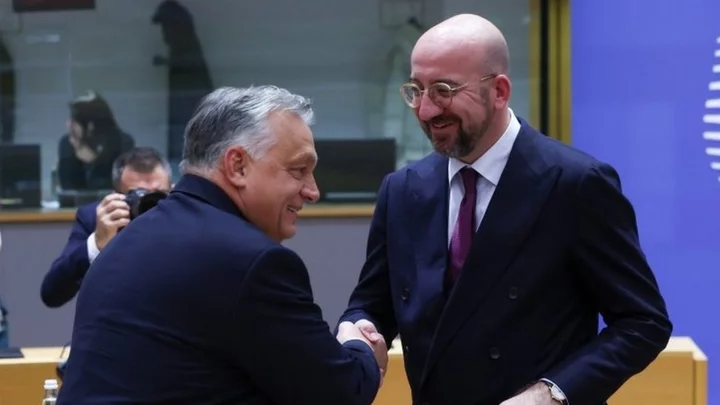
Israel Gaza: EU calls for 'corridors and pauses' for humanitarian aid
Member states disagreed over whether to call for short breaks in the fighting or a longer pause.
2023-10-27 05:53
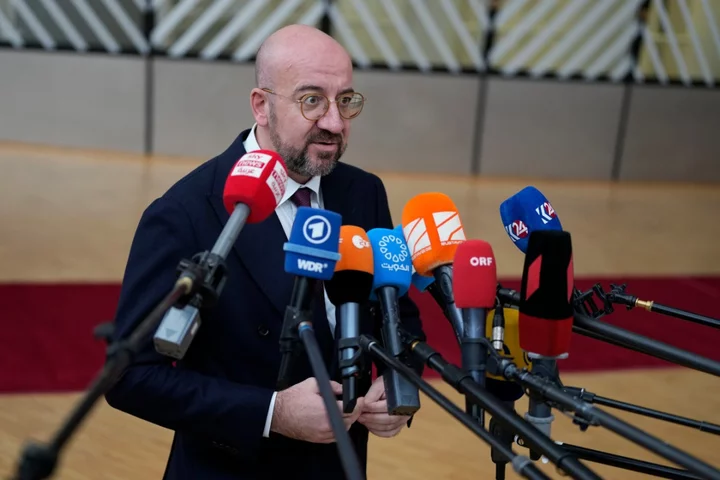
European Union leaders seek aid access to Gaza and weigh the plight of EU citizens there
European Union leaders gathered Thursday to debate ways to use their combined leverage to ensure that more aid reaches Palestinians in need, and how to help EU citizens in Gaza escape danger, including some held hostage by Hamas. EU nations have long been divided in their approach to Israel and the Palestinians, but the brutal nature of the Hamas attack on Israel on Oct 7., which killed more than 1,400 people, and the hardship of civilians forced from their homes in Gaza have shone a bright spotlight on those divisions. Across the EU spectrum, Austria, Germany and Hungary are among Israel's top supporters. The leaders of Austria and Germany went to Israel to show solidarity after the assault. Spain and Ireland often focus on the plight of the Palestinians. Hamas, for its part, is on the EU’s list of terrorist groups. The challenge has been to strike a balance between condemning the Hamas attacks, supporting Israel’s right to defend itself and ensuring that the rights of civilians on both sides are protected under international law. EU envoys have wrangled in recent days over whether to call for a “humanitarian pause” or “pauses,” or even a “window” in the fighting, to allow aid in. Israel’s strongest backers oppose any language that might be seen to constrain its right to self-defense. Meanwhile, the death toll in Gaza has soared past 7,000, according to Palestinian officials. It’s unprecedented in the decades-long Israeli-Palestinian conflict. A draft of the leaders’ summit statement, seen by The Associated Press, sees them call “for continued, rapid, safe and unhindered humanitarian access and aid to reach those in need through all necessary measures including humanitarian corridors and pauses.” Irish Prime Minister Leo Varadkar said: “I’m not obsessed about what language we use. What we want is the killing and the violence to stop; to stop so that humanitarian aid can get into Gaza, where Palestinian people are ... suffering, and also to allow us to get EU citizens out." He said that about 30 Irish Palestinian citizens are stuck. "We’re keen for them to be able to leave Gaza if they want to leave, and that’s currently not possible,” Varadkar told reporters. Despite its limited political leverage, the 27-nation bloc is the world’s top aid supplier to the Palestinians. It has sent almost 78 million euros ($82 million) this year and over 930 million euros ($982 million) since 2000. The EU has little influence over Israel – the United States is its staunchest ally – but remains the country’s biggest trade partner. The EU’s executive branch, the European Commission, has trumpeted what it calls an “air bridge” for Gaza – it consists of two plane loads of aid so far – and has demanded that more humanitarian assistance be allowed into poverty and conflict-hit Gaza. In recent days, Israel has let more than 60 trucks with aid enter from Egypt. Aid workers and the EU say it's not enough, just a tiny fraction of what came in before the war. Israel is still barring deliveries of fuel — needed to power generators — saying it believes that Hamas will take it. A warning by the U.N. agency for Palestinian refugees, UNRWA, over waning fuel supplies has raised alarm that the humanitarian crisis could quickly worsen. Gaza’s population has also been running out of food, water and medicine. The EU is UNRWA’s third biggest funder. Dozens of European nationals are believed to be among the more than 200 Israelis and foreigners taken hostage by Hamas. Scores more have been caught up in the turmoil as around 1.4 million of Gaza’s 2.3 million residents fled their homes under orders from the Israeli army. Exact numbers are difficult to establish as some countries prefer not to provide them for security reasons. EU officials also declined to say. Qatar has become a key interlocutor for countries hoping to have their captive nationals released. EU officials have said that Turkey could also play an important role, underscoring the need for the bloc to maintain good relations with countries in the region, beyond Israel. In the draft summit statement – perhaps due to the extreme security concerns – the leaders note only that they “reviewed the state of play and the follow-up on the different strands of action, including concerted efforts to assist EU citizens.” Read More Harris will attend an AI summit at a UK estate that was a base for World War II codebreakers European Union to press the leaders of Serbia and Kosovo to set decades of enmity behind them Europe's central bank is set to halt rate hikes as the Mideast war casts a shadow over the economy Israel-Hamas war could threaten already fragile economies in Egypt, Lebanon and Jordan British leader Rishi Sunak marks a year in office with little to celebrate Belgian police are looking for a Palestinian man following media report he could plan an attack
2023-10-26 22:20

ECB pauses record streak of rate hikes
LONDON The European Central Bank broke the longest streak of interest rate rises in its 25-year history on
2023-10-26 20:45

Europe Inc warns business is tough on home turf
By Silvia Aloisi and Richa Naidu LONDON/PARIS Some of Europe's top companies, including Volkswagen and Unilever warned on
2023-10-26 20:22
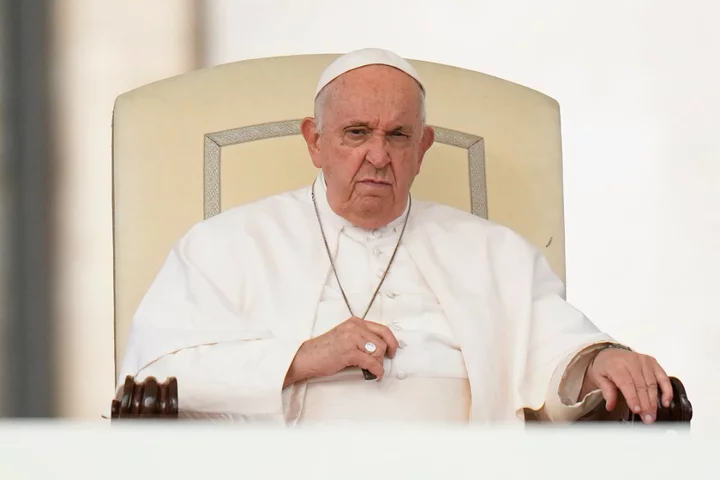
Pope accepts resignation of Polish bishop after ‘orgy’ scandal in diocese
The Pope on Tuesday accepted the resignation of a Polish bishop whose diocese has been hit by reports of an orgy involving priests and a male sex worker. The Vatican did not give any reason for the departure of 59-year-old Bishop Grzegorz Kaszak as head of the diocese of Sosnowiec, in southwestern Poland. The bishop resigned after one of his priests was placed under criminal investigation over reports from last month that he had organised a sex party. It was also alleged that the male sex worker who had been invited to the orgy involving priests from the diocese had lost consciousness due to an overdose of erectile dysfunction pills. In September, Gazeta Wyborcza, a liberal daily Polish newspaper, published a report stating that during the gathering, which took place in a facility owned by the parish of the Blessed Virgin Mary of the Angels in Dabrowa Gornicza, one of the priests had contacted emergency services to request an ambulance. But the paper — according to the New York Times — reported that the priests at the event hindered paramedics from helping the unconscious man. Paramedics later called the police and only then the priests relented. Waldemar Lubniewski, spokesman for the District Prosecutor’s Office in Sosnowiec, said at the time the investigation was focused on a “failure to provide assistance to a person in a situation that poses an immediate threat of loss of life or serious damage to health”. Father Tomasz Z, the priest who allegedly arranged the sex party within his church apartment, was identified solely by the diocese. He spoke with the Polish media last month, contesting the specific details of the incident. He questioned the accuracy of the count of priests present during the alleged sex party and remarked, “it is worth reading what the definition of an orgy is”. He brushed off the controversy over the events in his apartment as “an obvious attack on the church, including the clergy and believers” and said that the uproar would not have happened if “something similar had happened” to a person outside the clergy. But the diocese largely corroborated the media reports. It said that an outside investigative commission had concluded that Father Tomasz committed “a very serious violation of moral norms” as well as of his obligations as a priest. In a statement last month, the diocese said that the “participation” of Father Tomasz “in what happened on the night of August 30-31 is not in doubt”. It said that he had been stripped of all functions at the diocese and was “sent to live outside the parish”. Kaszak announced his resignation on 24 October but did not provide any more details. He has not been accused of having been involved in the alleged orgy but reports say he is being held responsible for the conduct of the priests under his diocese. “I ask everyone to forgive my human limitations,” he wrote in his statement. “If I have offended anyone or neglected something, I am very sorry.” Kaszak was designated as a bishop in 2009 by the then-Pope Benedict XVI, following a brief stint as the second-in-command in the Vatican’s family office. The Vatican embassy in Poland has announced that Archbishop Adrian Galbas of Katowice will serve as a temporary administrator, overseeing the diocese of Sosnowiec until the appointment of a new bishop. Read More The pope's absolute power, and the problems it can cause, are on display in 2 Vatican trials Vatican defends wartime Pope Pius XII as conference honors Israeli victims of Hamas incursion Pope Francis pushes to ‘open church to all’ as critics accuse him of ‘poisoning’ Catholicism 'Let's Fly,' the latest exhibition from the Balloon Museum, awakens childlike wonder in all of us Experts reconstruct the face of Peru’s most famous mummy, a teenage Inca sacrificed in Andean snow Pope accepts resignation of bishop of Polish diocese where gay orgy scandal under investigation
2023-10-26 19:53
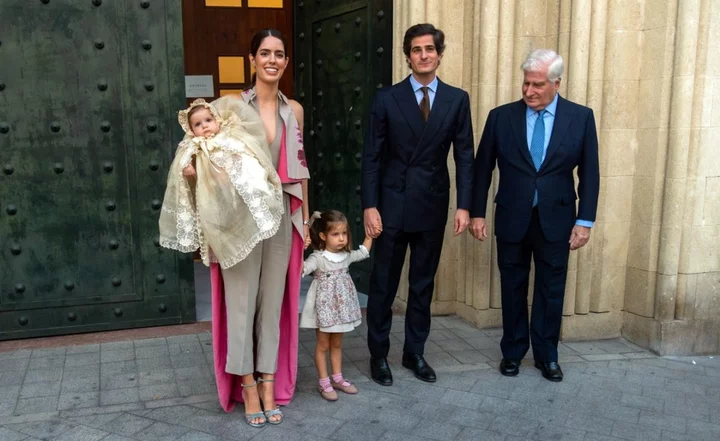
Your baby has too many names, Spanish duke told
Spain’s prestigious and most senior aristocratic dynasty has come under fire for breaking the rules - for having an unlawfully long name for the duke’s newborn. Fernando Juan Fitz-James Stuart y de Solís, 33, the 17th Duke of Huéscar and heir apparent to the dukedom of Alba, and Sofía Palazuelo, 31, his wife, wreaked havoc in the legal register office after they endowed their second child with over a dozen names. The astonishing name is as follows: Sofía Fernanda Dolores Cayetana Teresa Ángela de la Cruz Micaela del Santísimo Sacramento del Perpetuo Socorro de la Santísima Trinidad y de Todos Los Santos. But to their dismay, the register rules state that the name given to a child must not exceed more than one “one compound name” and “two simple ones,” as reported by El País. The duke had named his daughter after the late duchess, who died in 2014, aged 88, María del Rosario Cayetana Paloma Alfonsa Victoria Eugenia Fernanda Teresa Francisca de Paula Lourdes Antonia Josefa Fausta Rita Castor Dorotea Santa Esperanza Fitz-James Stuart y de Silva Falcó y Gurtubay. In addition to these 19 names, the Guinness World Records states that Cayetana held 46 titles which is more than any other noblewoman. The first name, Sofía, was chosen in honor of the newborn’s mother and grandmother, Sofía Barroso, and the second, Fernanda, as a tribute to her father, Duke of Huéscar, as well as her great-uncle, Fernando Martínez of Irujo, Marquis of San Vicente del Barco. But despite the tributes, “the girl will not be able to be registered in the Civil Registry with a string of names that surpass all rules, even though it is a tribute to the deceased Duchess of Alba and other members of the family and includes religious devotions,” Le Pais wrote. Read More New therapy offers hope for cancer patients with limited treatment options AI-generated child sexual abuse images could flood the internet. A watchdog is calling for action Spain’s acting government to push for a 37½-hour workweek. That's if it can remain in power
2023-10-26 19:49
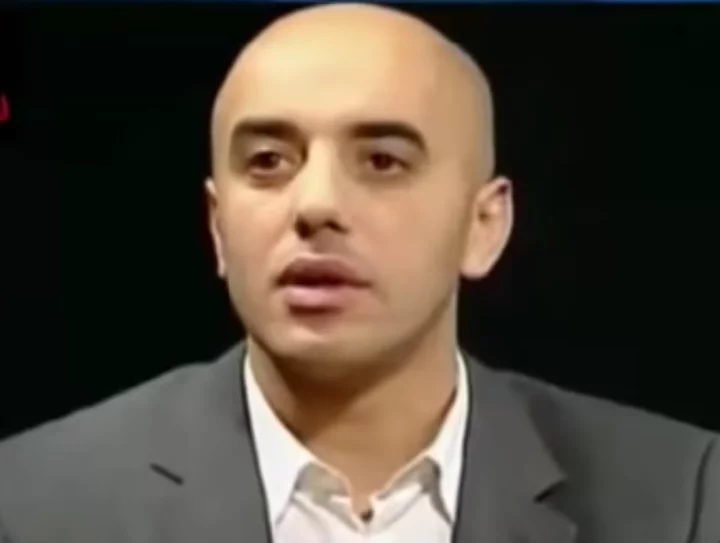
‘Getaway king’ French gangster who escaped prison in helicopter is jailed again
A jailed French gangster known as the “getaway king” after two dramatic escapes from prison - one involving a hijacked helicopter - will be locked up for a further 14 years. Redoine Faid, who says he drew inspiration for his criminal career from French and American gangster films, escaped from Reau prison, southeast of Paris, in July 2018. He had been in the prison’s visiting room when three men burst in and got him onto the aircraft, which had landed in one of the prison courtyards. Just five years earlier, in April 2013, he escaped from Sequedin prison in the north of the capital, using explosives to blast through five prison doors, taking four prison wardens hostage, and escaping in two getaway cars. A self-described “freedom addict”, Faid, who has multiple convictions for armed robbery, went on trial earlier this month and was this week sentenced to 14 years additional years behind bars for the prison break. The 51-year-old appeared at Assize Court with a smile and wearing a blue sweater. Among the 11 co-defendants were his two brothers, one of whom he greeted with a kiss, three nephews and a convicted member of the Corsica underworld. Prosecutors had requested 22 years for the jailbreak, spearheaded by Faid’s brother Rachid, who took a helicopter pilot hostage and ordered him to fly to the prison. Rachid got 10 years for his involvement in the plot. Three armed accomplices let off smoke bombs to confuse guards at the prison, one of the men - identified as Faid’s elder brother Rachid - used a disc grinder to cut through doors leading to the visiting room. Faid had been receiving a visit from another brother, Brahim. Inmates of the prison cheered as the helicopter took off with its new passenger, with the operation taking just 10 minutes. Brahim told the court he had no idea about the plan and he was acquitted. After Faid was sprung from the prison, the helicopter landed in Gonesse, a northeastern suburb of Paris, where he and his accomplices continued their escape by car. Authorities later found a burnt-out black Renault suspected of being the getaway car in Aulnay-sous-Bois, another suburb of the capital. The assailants are thought to have changed vehicles, continuing their escape in a van. Faid was arrested by special forces in October 2018 in an apartment located in the city of Creil, in the northern suburbs of Paris, having spent three months on the run. He had been seen dressed as a woman, wearing a burqa. In 2017, he was sentenced on appeal to 25 years in prison for masterminding a failed 2010 robbery, which claimed the life of a policewoman. As a young delinquent in a troubled suburb north of Paris, Faid took his inspiration from gangster movies. He told the court it was his love of freedom that drove him to escape from jail. "I’m in a concrete sarcophagus 23 hours out of 24… What am I going to do? Kick my heels indefinitely. I have an addiction which consumes me and which I cannot cure. I am addicted to freedom." Read More Russia-Ukraine war live: North Korea hands over 1,000 containers of weapons to Putin Putin’s many ‘heart attacks’ and why the rumours may be in his favour Russia recruits prisoners for Ukraine war as Putin replicates Wagner Russia-Ukraine war live: North Korea hands over 1,000 containers of weapons to Putin Putin’s many ‘heart attacks’ and why the rumours may be in his favour Russia recruits prisoners for Ukraine war as Putin replicates Wagner
2023-10-26 17:47
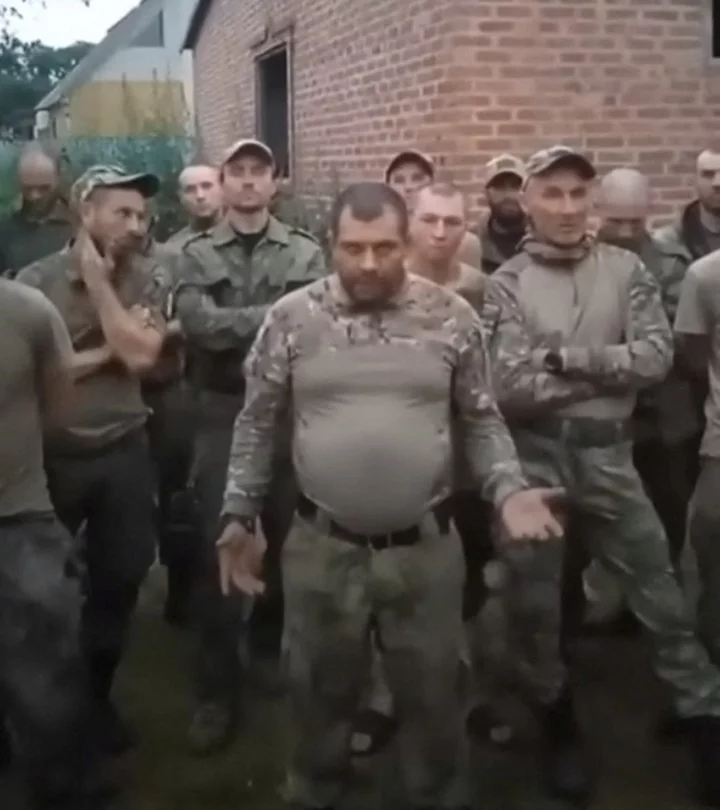
Russia recruits prisoners for Ukraine war as Putin replicates Wagner
Russia has taken the wheel from Wagner as the Kremlin has recruited up to 100,000 prisoners to fight in Ukraine. The practice was a trademark move of the late mercenary boss Yevgeny Prigozhin, who filled his group’s ranks with convicted criminals. The army unit, commonly known as Storm-Z, is reportedly seen as a disposable force in Vladimir Putin’s “special military operation”. It comes as the Russian prison population has dropped from an estimated 420,000 to around 266,000, according to deputy minister Vsevolod Vukolov, who disclosed the figures earlier this month. Russian state-controlled media reported that Storm-Z squads exist, that they took part in intense battles and some of their members received medals for bravery, but it has not disclosed how they are formed, or the losses they take. While the Russian defence ministry has never acknowledged creating Storm-Z units, the first reports of their existence emerged in April when the Institute for the Study of War cited what it said appeared to be a leaked Russian military report on the formation of the squads. RTVI, a Russian news website, said Storm-Z “is the same scheme as with the [Wagner] private military company. Prisoners sign contracts with the defence ministry, and after completing them they can go home or continue serving”. However, a Russian soldier who fought alongside members of the penal squad told Reuters that Storm-Z fighters “are just meat”. The soldier, from army unit no. 40318 who was deployed near Bakhmut in May and June, said he’d given medical treatment to a group of six or seven wounded Storm-Z fighters on the battlefield. In doing so, he had disobeyed an order from a commander - whose name he didn’t know - to leave the men. He said he didn’t know why the commander gave the order, but claimed that it typified how Storm-Z fighters were considered of lesser value than ordinary troops by officers. The soldier, who requested anonymity because he feared prosecution in Russia for publicly discussing the war, said he had sympathy for the men’s plight: “If the commandants catch anyone with the smell of alcohol on their breath, then they immediately send them to the Storm squads.” The UK ministry of defence addressed the emergence of the penal squads in its update on 24 October, saying: “Russia largely continues to rely on specially designated ‘Shtorm-Z’ units for local offensive operations in Ukraine.” It said: “Multiple accounts suggest the units are given the lowest priority for logistical and medical support, while repeatedly being ordered to attack.” The intelligence update added that the squads were “likely first fielded in 2022” and they highlight “the extreme difficulty Russia has in generating combat infantry capable of conducting effective offensive operations”. Read More The Body in the Woods | An Independent TV Original Documentary The harrowing discovery at centre of The Independent’s new documentary Live updates | Israeli troops briefly enter Gaza as wider ground incursion looms Europe's central bank is set to halt rate hikes as the Mideast war casts a shadow over the economy Putin presides over rehearsals of 'massive' Russian nuclear strike
2023-10-26 16:27
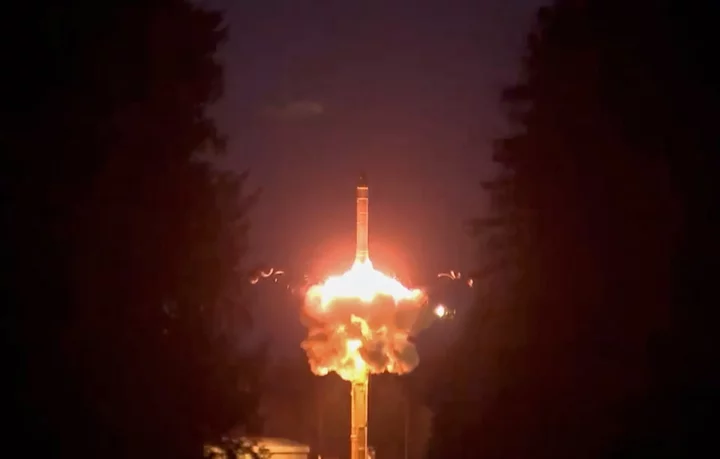
Ukraine-Russia war - live: Putin ‘rehearses massive nuclear strike’ as drones strike near Khmelnytskyi plant
Vladimir Putin has tested Russia’s ability to launch a massive retaliatory nuclear strike as he pulled the country out of an international test ban treaty. “Practical launches of ballistic and cruise missiles took place during the training,” Russian defence minister Sergei Shoigu said. A Yars intercontinental ballistic missile was fired in Russia’s far east, a nuclear-powered submarine launched a ballistic missile from the Barents sea, and long-range bombers test fired air-launched cruise missiles, according to the Kremlin. On Wednesday, Russia’s parliament unanimously approved legislation pulling the country out of the international Comprehensive Nuclear Test Ban Treaty, designed to limit the proliferation of nuclear weapon testing. It comes as a Russian drone attack damaged buildings near the Khmelnytskyi nuclear power plant in western Ukraine, wounding 20 people. The Ukrainian air force destroyed all 11 Russian drones, according to the military. Damage was caused by blast waves and falling debris. “At night, the enemy struck territory near the Khmelnytskyi nuclear power plant. As a result of the explosion, windows in administrative and laboratory buildings have been damaged,” Ukraine’s Energy Ministry said on the Telegram messaging app. Read More Russian drones likely targeted Khmelnytskyi nuclear power station, Zelensky says Business owners in a Ukrainian front-line city adapt even as 'a missile can come at any moment' Russian forces simulate nuclear strike as upper house rescinds ratification of test-ban treaty
2023-10-26 14:59
